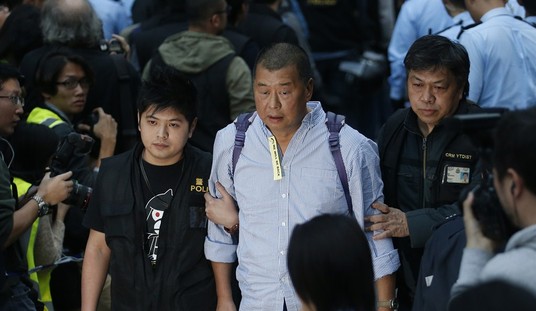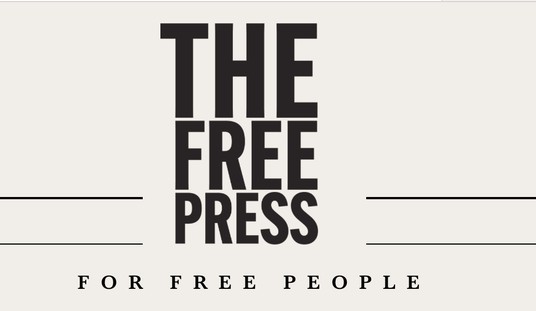Was this option on the table? Supporters and critics alike of the President had plenty of suggestions about what the US could do in response to Russia’s invasion of Crimea three weeks ago and its annexation this week. No one of note suggested that the US should attack Russia to reclaim Crimea for Ukraine. However, Barack Obama made two appearances on local television to assure Americans that the suggestion that no one suggested would not become policy, or something:
“We are not going to be getting into a military excursion in Ukraine,” the president said in an interview with NBC’s San Diego affiliate, KNSD, one of several he did Wednesday. “What we are going to do is mobilize all of our diplomatic resources to make sure that we’ve got a strong international coalition that sends a clear message, which is that Ukraine should decide their destiny.” …
Obama said that he sees Russian President Vladimir Putin acting “out of weakness, not out of strength” in attempting to take control of Crimea. Putin, the president said, is “not comfortable” with former members of the Soviet Union making moves to align themselves with the West.
In another interview, with St. Louis NBC affiliate KSDK, Obama also said that a military option is not on the table.
“Obviously, you know, we do not need to trigger an actual war with Russia,” he said. “The Ukrainians don’t want that. Nobody would want that.”
Politifact would rate this as true, because literally no one wants that. That’s not a Bidenesque literally, but a literal literally. No one wants it, no one would approve it, and for a couple of really good reasons — we have no national interest in who governs Crimea, and an attempt to start a war there would make Dieppe look well-considered. It’s in the Russian’s back yard.
So why bother saying it at all? That’s the curious aspect of this. Obama has an annoying habit of attempting to present his critics’ arguments in his own fantasy reductio ad absurdum constructs that end up bearing no resemblance to the actual criticisms, all to paint himself as the voice of centrist reason. This, however, just makes him look as out of touch as the rest of his foreign policy — with an extra added dollop of weakness as the a la mode touch.
Paul Mirengoff calls this a “false choice,” and a bad signal to send:
In ruling out military action, Obama explained that “the Ukrainians don’t want [an actual war with Russia], nobody would want that.” But if Russia continues to devour their country, the Ukrainians are no less likely to want a war than any of Russia’s other neighbors or former client states would be under similar circumstances.
Accordingly, Obama’s statement can be read by Russia as ruling out any U.S. military to stop any future aggression within the former Soviet Union and perhaps within its entire former sphere of influence. Perhaps Obama would have been better advised not to have made this statement.
The other problem with the statement is that, to use Obama’s former pet phrase, it presents us with a false choice. America’s options aren’t limited to taking military action and “mobilizing diplomatic resources to send a clear message.”
We could, for example, provide weapons and ammunition to Ukraine. Ukraine could then decide whether to use them in the event of further Russian aggression. Ukraine has, in fact, requested weapons and ammunition, but Obama turned down the request.
I suspect we have not supplied Ukraine with weapons because we want to diminish the prospect of Ukrainian resistance in the event Russia moves into Eastern Ukraine (which Russia seems at least as likely as not to do). Ukrainian resistance is not in Obama’s interest, as he likely sees it, because the resulting bloodbath would further embarrass his administration.
And that question may become acute quickly. NATO’s top concern at the moment is that Vladimir Putin won’t stop at Crimea, Secretary-General Anders Fogh Rasmussen told Foreign Policy’s Yochi Dreazen:
NATO’s top official acknowledged in an interview that Russia’s annexation of Crimea had “established certain facts on the ground” that would be difficult to change and said the military alliance was increasingly concerned that Moscow might also invade eastern Ukraine.
In the interview, NATO Secretary General Anders Fogh Rasmussen toldForeign Policy that Russia’s sudden conquest of Ukraine’s Crimean peninsula was a “wake-up call” for the 28-member alliance, which had been established to counter potential Soviet aggression during the Cold War. Rasmussen said NATO was committed to protecting Poland and other Baltic members of the alliance from what he described as an increasingly aggressive and land-hungry Russian government. …
“Our concern is that Russia won’t stop here,” Rasmussen said. “There is a clear risk that Russia will go beyond Crimea and the next goal will be the eastern provinces of Ukraine.”
A Russian invasion of eastern Ukraine, he added, “would have severe consequences.”
At this point, it is more important to send signals of strength rather than offer nonsense statements about demands that no one is making. This administration won’t even make an explicit threat to kick Russia out of the G-8, as the UK finally did yesterday, or even permanently cancel its June meeting in response to the Russian invasion of Crimea. It’s certain that Putin’s not worried about military action or of much of anything else in a coordinated Western response. It’s time that Obama left the “fantasy” world described by the Washington Post earlier this month and start dealing with the reality of global power.







Join the conversation as a VIP Member